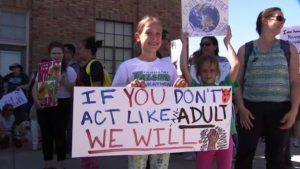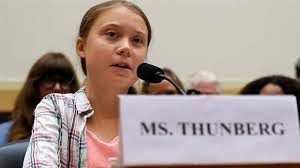 Fueled by the passion of Youth4Climate, some 4 million people joined the October 20 Global Climate Strike. And just like that, youth took on the mantle of leadership of the climate crisis. Shouting truth to power, they demanded action to ameliorate the consequences of decades of inaction on the billions of young people who face the nightmare of a climate ravaged world in 2050.
Fueled by the passion of Youth4Climate, some 4 million people joined the October 20 Global Climate Strike. And just like that, youth took on the mantle of leadership of the climate crisis. Shouting truth to power, they demanded action to ameliorate the consequences of decades of inaction on the billions of young people who face the nightmare of a climate ravaged world in 2050.
Twenty days of lethal heat per year. Collapsed ecosystems. And more than 1 billion people displaced.
Those are all probable scenarios that could devastate societies by 2050 if swift and dramatic action isn’t taken to curb climate change, according to a think tank report backed by a former Australian military chief.
The paper, by the Melbourne-based Breakthrough National Center for Climate Restoration, is not a scientific study, but an attempt to model future scenarios based on existing research.
It paints a bleak future in which more than a billion people are displaced, food production drops off and some of the world’s most populous cities are left partially abandoned. Climate change could pose ‘existential threat’ by 2050: report Climate change could pose ‘existential threat’ by 2050: report
 Sixteen-year-old Swede Greta Thunberg addressed world leaders at the United Nations Climate Summit — “… you are failing us, But the young people are starting to understand your betrayal. The eyes of all future generations are upon you, and if you choose to fail us, I say, we will never forgive you.”
Sixteen-year-old Swede Greta Thunberg addressed world leaders at the United Nations Climate Summit — “… you are failing us, But the young people are starting to understand your betrayal. The eyes of all future generations are upon you, and if you choose to fail us, I say, we will never forgive you.”
Evolutional psychology provides an insight into the impetus behind the global awakening of the worldwide #Youth4Climate movement: Their survival is threatened. It’s purely an instinctual behavior.
From an evolutionary point of view, behaviors are not made consciously: they are instinctual, and based on what is most advantageous in terms of passing one’s genes on to the next generation. William James (1842–1910) was an important contributor to early research into motivation, and he is often referred to as the father of psychology in the United States. James theorized that behavior was driven by a number of survival instincts. From a biological perspective, an instinct is a species-specific pattern of behavior that is not learned.
 But the unbridled power of Youth, not only in the environmental arena but also in Florida’s Parkland students activism on gun violence can also be viewed through the lens of Maslow’s hierarchy of needs. Maslow initially believed that an individual would progress in a linear manner through the hierarchy; so, for example, physiological and safety needs must be met before an individual moves on to address higher order needs.
But the unbridled power of Youth, not only in the environmental arena but also in Florida’s Parkland students activism on gun violence can also be viewed through the lens of Maslow’s hierarchy of needs. Maslow initially believed that an individual would progress in a linear manner through the hierarchy; so, for example, physiological and safety needs must be met before an individual moves on to address higher order needs.
When Maslow originally explained the hierarchy in 1943, he stated that higher needs generally won’t be pursued until lower needs are met. However, he added, a need does not have to be completely satisfied for someone to move onto the next need in the hierarchy. Instead, the needs must be partially satisfied, meaning that an individual can pursue all five needs, at least to some extent, at the same time.
Maslow included caveats in order to explain why certain individuals might pursue higher needs before lower ones. For example, some people who are especially driven by the desire to express themselves creatively may pursue self-actualization even if their lower needs are unmet. Similarly, individuals who are particularly dedicated to pursuing higher ideals may achieve self-actualization despite adversity that prevents them from meeting their lower needs.Understanding Maslow’s Theory of Self-Actualization
Those who attain self actualization, Maslow contended, are capable of transcending reality through ‘peak experiences.’ They are highly creative and autonomous and fueled by the belief that they are part of something which is larger than themselves.
The Youth4Climate movement resides in this fifth dimension, occupying a unique space fueled by the passion to save the planet. And in this rarified atmosphere, Maslow’s pyramid is upended. Physiological and safety needs are endangered. Needs for love and respect take a back seat to self-esteem, strength, and freedom. And the power of the collective gives birth to self actualization of the whole.
